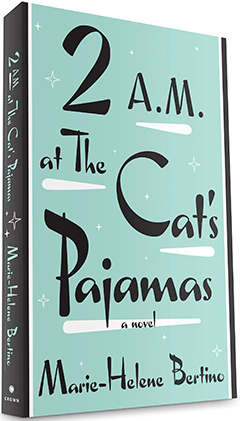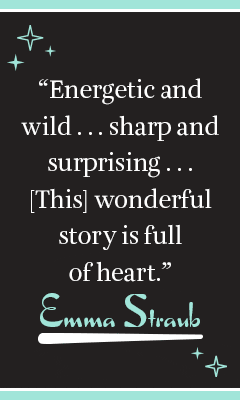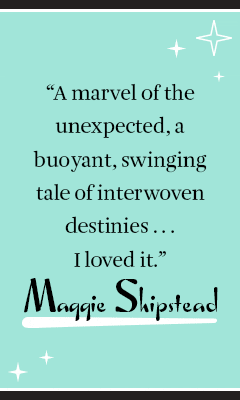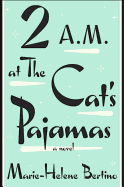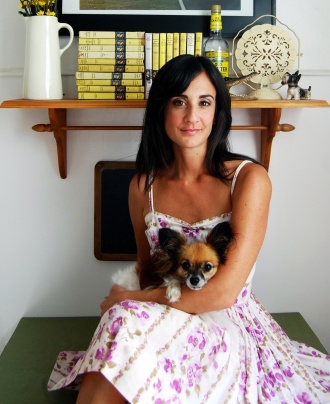2 A.M. at The Cat's Pajamas
by Marie-Helene Bertino
Philadelphia native Marie-Helene Bertino (author of the story collection Safe as Houses) spotlights her home city in a torch song to the power of jazz, determination and serendipity. A cast of misfits, outsiders and the occasional has-been muddle through the two days before Christmas, unaware that their lives are on a collision course with each other and with the miraculous.
Precocious nine-year-old Madeleine Altimari already knows her calling in life is to follow in the footsteps of her late mother, a jazz singer "whose voice could redirect the mood of a room." Now that cancer has taken her mother and depression and addiction have hijacked her father, Madeleine can count on only herself to make her dreams come true. Unfortunately, she can't catch a break on stage, especially when the world loves sweet, straight-laced girls like her school rival Clare, and Madeleine herself is, frankly, "a jerk," albeit a thousand times more interesting than Clare because of it. Madeleine is as trapped in her cockroach-infested life as her "friend" the blue carousel horse: "Madeleine can feel its yearning to go up and down, its hooves frozen in midgallop.... It's busted, marooned and affixed to the sidewalk by an indiscreet pole, with no carnival for miles and no equine company." But when she learns of the existence of one of Philadelphia's remaining jazz clubs, The Cat's Pajamas, Madeleine fills with purpose: to find the club, get herself on stage, and sing her lungs out to glory. Her neighbor Mrs. Santiago warns her, "They turn all the lights out because no one there is afraid of the dark and they laugh at people who are. The Cat's Pajamas is a meeting place for gypsies who eat roaches. Gypsies, roaches, and ice cream men." Dead mothers, neglectful fathers and biased school administrations be damned, "Using mittens, boots, a scarf, and an umbrella, Madeleine turns herself into a warm, dry house" and sets out to claim her destiny.
However, times are rough at The Cat's Pajamas, a club in decline. Jack Lorca, the owner, faces citations for everything from excessive smoke to staying open past 2 a.m. to a drummer dousing his drum set in lighter fluid, adding up to a grand total of $30,000 that he and his friends don't have. If he doesn't keep his nose clean and pay the fine, he'll lose the club. His recent breakup with longtime girlfriend Louisa only compounds his misery, as does his strained relationship with his teenage son, Alex, with whom he has trouble relating because "They're making young people younger. Or else Lorca is older than he has ever been. He feels like he is slipping down a hill of ice."
Sarina Greene, Madeleine's art teacher, accepts an invitation to a holiday party knowing her old high school flame, Ben, will also attend. Sarina recently moved back to Philadelphia after divorcing her husband, Ben is married; still, Sarina can't help wishing for sparks to fly. When the two meet again, though, they fall right back into the pattern of mistaken assumptions and unspoken feelings that killed their high school romance before it could take flight. Can one long midnight walk to The Cat's Pajamas turn the one that got away into happily ever after?
Bertino's carefully crafted verbal cadence gives Philadelphia a thumping heartbeat that captures the feel of the jazz medium perfectly. Her characters' lives combine, diverge and riff off of each other like solos traded between musicians in a well-oiled jazz ensemble. Although setting a modern story around a jazz club may strike some readers as a strange choice, Bertino does an excellent job of showing that jazz and all its varied forms remain as vibrant and descriptive of the human experience today as ever. She makes the passage of musical tradition through families a recurring theme, even when acknowledging that not all family legacies are as pleasant: "We carry our ancestors in our names and sometimes we carry our ancestors through the sliding doors of emergency rooms and either way they are heavy, man, either way we can't escape." Balancing whimsy and reality is clearly one of Bertino's gifts; readers aren't often treated to dream sequences in which talking cockroaches admonish heroines about giving up too easily. Her instinct for pushing the boundaries of probability into the realm of the small miracle gives readers the sense that if something unforeseen but truly good could happen at a run-down jazz club on Christmas Eve, then it could happen at any moment if we just keep our eyes peeled. With characters who could have been picked out of any crowd, Bertino never puts any of the magic out of the reach of everyday people. Funny and wise, this first novel will leave readers with smiles on their faces and a song in their hearts--something with a little swing to it, naturally. --Jaclyn Fulwood



